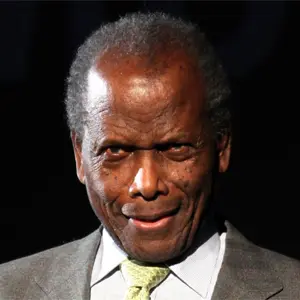Sidney Poitier, who helped break down Hollywood’s onscreen color barriers, dies at 94
-

The first Black man to win a competitive Oscar for best actor, Poitier was a trailblazer as a Black leading man of the 1950s and 1960s with such films as In the Heat of the Night and Guess Who’s Coming to Dinner. Bahamas Minister of Foreign Affairs Fred Mitchell announced the actor's passing in the Bahamas. Poitier was awarded two Oscars: best actor for 1963's Lillies in the Field and an honorary award in 2002 "for his extraordinary performances and unique presence on the screen and for representing the industry with dignity, style and intelligence." "Tall and handsome, with a low and seductively smooth voice and what one writer called an 'almost princely bearing,' Poitier projected an air of quiet dignity in roles that shattered stereotypes," says Dennis McLellan in Poitier's Los Angeles Times obituary. "For me, the greatest of the 'Great Trees' has fallen: Sidney Poitier," wrote Oprah Winfrey of the actor, her role model, who once surprised her on her show. "My honor to have loved him as a mentor. Friend. Brother. Confidant. Wisdom teacher. The utmost, highest regard and praise for his most magnificent, gracious, eloquent life. I treasured him. I adored him. He had an enormous soul I will forever cherish. Blessings to Joanna and his world of beautiful daughters." Fellow Oscar winner Viola Davis tweeted: "This is a big one. No words can describe how your work radically shifted my life. The dignity, normalcy, strength, excellence and sheer electricity you brought to your roles showed us that we, as Black folks, mattered!!! It was an honor." Poitier also earned two Emmy nominations: for playing Nelson Mandela in Showtime's 1997 TV movie Mandela and de Klerk and for playing Thurgood Marshall in the 1991 ABC miniseries Separate But Equal.
ALSO:
- We are in a world Sidney Poitier helped us reach: "We have Black blockbuster stars and Black directors and producers, Black character actors and Black leading men, and several Black Oscar winners who were not yet born when Poitier won the trophy," says Mark Harris. "To some of the younger ones, his name, back in the news this week, must have felt remote, a reminder of a distant figure from another time. It's not just that Poitier crossed a bridge they never had to cross. It's that he became the bridge, connecting a Hollywood in which African Americans were consigned to playing sidekicks, stereotypes, and shuffling servants — 'toms, coons, mulattoes, mammies, and bucks,' as film historian Donald Bogle put it with brutal accuracy in the title of his seminal history of Black Hollywood — to an era in which those caricatures continue to give way, albeit with painful slowness, to a richer, deeper, more human variety of roles and, eventually, of opportunities."
- Why all actors owe a debt of gratitude to Sidney Poitier: "There were great actors before Sidney Poitier, and great ones since," says Stephanie Zacharek. "But the world would have been markedly different without Poitier—the first Black actor to win an Oscar for Best Actor—who arrived on the theater and film scene in post-World War II America just as this country, not to mention the world, was scrambling to reassemble itself. Poitier, who has died at 94, helped reshape that world to such a degree that we’ll never be able to reckon fully with his impact. All actors owe him a debt, and all Americans do, too."
- Read tributes to Poitier from Tyler Perry, Whoopi Goldberg, Blair Underwood and more Hollywood stars
TOPICS: Obits, Oprah Winfrey, Sidney Poitier, Viola Davis, African Americans and TV
